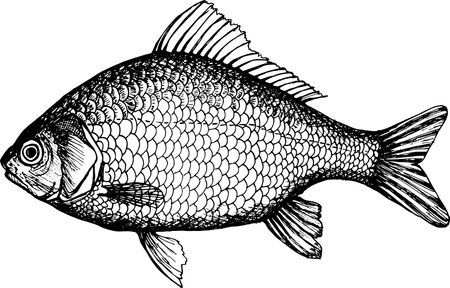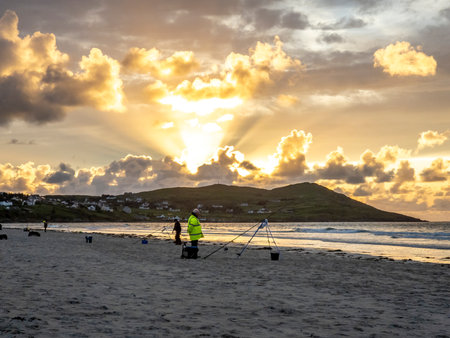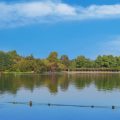Introduction to Sea Fishing in Wales
Wales, with its rugged coastline stretching for over 870 miles, stands as a true haven for sea fishing enthusiasts. The Welsh coast boasts an incredible diversity of fishing opportunities, making it a magnet for anglers of every background—from seasoned veterans armed with decades of experience to absolute beginners keen on casting their first line. What sets Wales apart is not only the sheer abundance and variety of marine life found in its waters but also the distinct character and charm infused into each fishing trip by its local communities.
From the serene estuaries of North Wales to the dramatic cliffs and hidden coves of Pembrokeshire and Gower, the region offers year-round sea fishing prospects. Whether you’re after hard-fighting bass, delicious mackerel, or elusive tope, Welsh coastal waters provide a veritable playground for all.
| Region | Popular Species | Unique Features |
|---|---|---|
| North Wales | Bass, Dogfish, Smoothhound | Sheltered bays and rich estuaries |
| Pembrokeshire | Pollack, Wrasse, Tope | Dramatic cliffs and pristine beaches |
| Gower Peninsula | Mackerel, Bass, Rays | UNESCO-listed scenery and easy access points |
| Cardigan Bay | Bream, Huss, Flatfish | Dolphin spotting and peaceful harbours |
The combination of accessible guided charters and the warm hospitality of local skippers ensures that sea fishing in Wales isn’t just about the catch—it’s about unforgettable adventures along some of Britain’s most spectacular and underappreciated coastal gems. Whether you’re drawn by tales of trophy-sized catches or simply wish to soak up the wild beauty of the Welsh shoreline, there’s no denying that Wales has firmly cemented its reputation as one of the UK’s premier sea angling destinations.
2. Why Choose a Guided Charter?
If you’re considering sea fishing along the Welsh coast, booking a guided charter is hands-down one of the wisest decisions you can make—especially if you want to uncover those hidden gems that only locals know about. The rugged Welsh shoreline offers an impressive array of species and breathtaking scenery, but navigating its waters isn’t always straightforward. That’s where the practical advantages of a guided charter truly shine.
Local Expertise You Can Rely On
Welsh skippers have spent their lives mastering these tidal waters. Their deep-rooted knowledge of local fish behaviour, seasonal patterns, and the safest fishing spots ensures your trip won’t just be memorable—it’ll be productive. Whether you’re targeting bass off Pembrokeshire or hunting for tope near Anglesey, a seasoned skipper knows exactly where to take you.
Tailored Advice for Every Angler
Another standout benefit is the tailored advice you’ll receive. It doesn’t matter if you’re a first-timer or an old hand with a rod—guides personalise their approach based on your experience and goals. Want to learn how to rig up for wrasse or master casting into rough surf? Your guide will walk you through it step by step, in plain English and with that trademark Welsh patience.
What Guided Charters Offer
| Feature | Description |
|---|---|
| Local Knowledge | Access to secret spots & migratory patterns only locals know |
| Expert Tuition | Hands-on instruction on techniques and bait selection |
| All Tackle Provided | No need to bring your own gear—everything’s sorted |
| Safety Assured | Guides are trained in first aid & local regulations |
| Camaraderie & Craic | A proper day out with good company and plenty of laughs |
The Opportunity to Learn from Seasoned Welsh Skippers
The cherry on top? You’re not just hiring a boat—you’re tapping into generations of seafaring wisdom. These skippers are as much storytellers as they are fishermen; they’ll regale you with tales of monster catches and near misses while teaching you the finer points of Welsh sea angling. In short, a guided charter turns an ordinary fishing trip into a masterclass—and gives you memories (and skills) that last well beyond your time on the water.

3. Hidden Coastal Gems: Top Fishing Spots Revealed
Wales is famed for its rugged coastline and thriving marine life, but seasoned anglers know there’s a wealth of lesser-known fishing locations that rival the more popular hotspots. These hidden gems offer not only tranquillity but also the chance to land some truly impressive catches – provided you know where to look. Below, I’ll share a handful of my favourite under-the-radar spots, each with its own unique charm and set of challenges.
| Location | Best Target Species | Insider Tips |
|---|---|---|
| Porth Dinllaen (Llyn Peninsula) | Bass, Pollack, Wrasse | Avoid peak summer weekends for peaceful sessions; fish close to the rocky outcrops at first light for bass on surface lures. |
| Cemaes Bay (Anglesey) | Mackerel, Dogfish, Plaice | The eastern side near the old harbour wall is ideal after dusk; use ragworm or lugworm for flatfish success. |
| Abercastle (Pembrokeshire) | Bull Huss, Conger Eel, Smoothhound | Fish the deeper channels during an incoming tide; night sessions yield larger congers but bring heavy tackle. |
| Llansteffan Sands (Carmarthenshire) | Flounder, Bass | Perfect for beginners and families; shallow sandbanks fish best two hours before and after high tide using peeler crab bait. |
What Sets These Spots Apart?
Unlike the crowded piers and well-publicised beaches, these coastal gems reward those willing to venture off the beaten path. Whether it’s the dramatic backdrop of Abercastle’s cliffs or the sheltered coves of Cemaes Bay, every location offers something distinct. The relative seclusion often means less fishing pressure and a higher chance of encountering specimen-sized fish.
A Word from Experience
I’ve spent countless early mornings casting into misty Welsh waters and can vouch that these sites deliver both in terms of scenery and sport. My advice: respect local conditions, keep your rigs simple, and always check tidal movements before setting out. With a little preparation and local know-how, Wales’ hidden coastal treasures can provide unforgettable angling experiences.
4. Typical Welsh Catches and Seasonal Highlights
Wales’ diverse coastline offers a rich variety of sea fishing opportunities, with each season unveiling new treasures for anglers. Guided charters along the Welsh coast are expertly tailored to maximise your chances of encountering prime species at their peak. Below, you’ll find a detailed overview of the most sought-after catches and the best times and locations to target them.
Most Common Species Along the Welsh Coast
| Species | Prime Season | Best Locations |
|---|---|---|
| Bass | May – October | Cardigan Bay, Gower Peninsula, Pembrokeshire |
| Mackerel | June – September | Llyn Peninsula, Anglesey, Tenby |
| Tope | June – August | Carmarthen Bay, Holyhead Deep |
| Smoothhound | May – July | Bristol Channel, South Wales coasts |
| Ray (Thornback, Blonde) | All year (peak March – June) | Bristol Channel, Swansea Bay |
| Pollack & Wrasse | April – October | Pembrokeshire headlands, North Wales reefs |
Seasonal Fishing Highlights in Wales
The Welsh sea fishing calendar is punctuated by distinct highlights that every angler should know. In spring, species like ray and early bass begin to appear as waters warm. Summer brings prolific mackerel shoals and smoothhound runs—perfect for both beginners and seasoned rods looking for action. Late summer into autumn is prime time for bass, with trophy specimens often landed from boat and shore alike.
Tactical Advice: When and Where to Fish?
- Bass: Early mornings on rising tides around rocky outcrops or estuaries produce best results from May through October.
- Mackerel: Schools move close inshore during settled weather; try feathering off piers or charter boats in late summer.
- Tope: Head out on deep-water charters from June; Holyhead Deep is renowned for double-figure fish.
- Smoothhound: Target shallow sandy bays in early summer using peeler crab baits.
- Wrasse & Pollack: Drift fishing over reefs in Pembrokeshire can yield impressive catches throughout the warmer months.
A Local’s Tip: Adapt to Conditions!
The seasoned Welsh charter skippers know that wind direction, tide state, and recent weather patterns all influence what’s biting where. If you’re after a particular species, communicate with your guide—they’ll steer you towards the hidden gems that match the conditions on the day. By targeting the right place at the right time, your trip along the Welsh coast will be both memorable and productive.
5. What to Expect on a Welsh Sea Fishing Charter
If you’re considering booking one of Wales’ premier guided sea fishing charters, knowing what your day might look like can make all the difference. Here’s a practical rundown based on real-world experience, so you’ll arrive well-prepared and ready to soak up both the sport and the atmosphere.
Arrival and Warm Welsh Welcome
Your day typically kicks off at a local harbour—think Aberystwyth, Pwllheli, or Milford Haven—where you’ll be greeted by your skipper and crew with a friendly “Bore da!” (Good morning!). Expect a thorough safety briefing, along with an introduction to the boat and its facilities. The hospitality is unmistakably Welsh: warm, genuine, and inclusive.
Gear Provided & What to Bring
Most top-tier charters provide all essential fishing gear. Here’s a quick look at what’s usually covered:
| Provided by Charter | What You Should Bring |
|---|---|
| High-quality rods & reels Tackle & bait Life jackets Hot drinks (tea/coffee) Waterproofs (often available) |
Warm layered clothing Sturdy non-slip footwear Sunscreen & hat Camera for those big catches Snacks or lunch (unless specified) |
The Fishing Experience: From Novice to Pro
No matter your skill level, Welsh skippers are renowned for their patience and expertise. The day is structured around targeting seasonal species—from hard-fighting bass to specimen-sized pollack or even elusive tope—always keeping sustainability in mind. Instruction is hands-on; don’t be surprised if you pick up some local tips passed down through generations.
A Taste of Traditional Welsh Hospitality Onboard
Between casts, it’s not uncommon to enjoy a cuppa brewed right on deck. Some charters take it a step further, offering Welsh cakes or bara brith to keep spirits high. Stories flow freely, often peppered with local history or folklore about the coastline—part of what makes these trips so much more than just a day’s fishing.
Packing Up & Sharing the Days Catch
After several hours on the water, you’ll head back to harbour. Skippers typically help clean and fillet your catch if you wish to take it home—a tradition that adds a satisfying conclusion to the outing. It’s customary to thank your crew; tips are appreciated but never expected.
A Welsh sea fishing charter promises not just sport but camaraderie, heritage, and scenery you’ll remember long after the last fish is landed.
6. Sustainable Angling and Local Stewardship
If you’re venturing out on one of Wales’ premier guided sea fishing charters, you’ll quickly notice that sustainability isn’t just a buzzword—it’s a way of life along the Welsh coast. Our local skippers and guides have grown up with these waters, and their livelihoods depend on the long-term health of the marine ecosystem. As a result, conservation and responsible angling practices are at the very heart of every charter experience.
Championing Conservation: A Collective Effort
Welsh charters are leading the charge in sustainable fishing through several practical initiatives. Skippers often educate guests on the importance of catch-and-release for vulnerable species, promote minimum landing sizes, and carefully monitor bag limits to prevent overfishing. Many even take part in regional research projects, collaborating with marine biologists to track fish populations and breeding grounds.
Key Sustainable Practices Adopted by Welsh Charters
Practice |
Description |
Benefits |
|---|---|---|
| Catch-and-Release | Releasing non-target or undersized fish back to the sea | Protects juvenile stocks and supports species recovery |
| Minimum Landing Sizes | Strict adherence to legal size limits for each species | Ensures only mature fish are taken, sustaining future stocks |
| Bag Limits | Capping the number of fish kept per angler per day | Prevents overexploitation and maintains healthy populations |
| Tackle Selection | Using barbless hooks and biodegradable tackle where possible | Reduces injury to released fish and minimises environmental impact |
| Community Science Projects | Contributing catch data to local research initiatives | Aids ongoing conservation efforts and policy-making |
The Role of Anglers: Custodians of Welsh Waters
No matter your skill level, when you book a guided sea fishing charter in Wales, you become part of a wider stewardship community. Guides encourage anglers to respect local bylaws, report suspicious activities such as illegal netting, and help clean up beaches or harbours after a day’s fishing. These small but meaningful actions ensure that the hidden gems of the Welsh coast will remain unspoilt for generations to come.
7. How to Book and Prepare
Booking your Welsh sea fishing adventure is a straightforward process, but a bit of careful planning will ensure you get the most from your day on the water. Here’s a step-by-step guide to help you secure your spot and prepare for an unforgettable experience along Wales’ stunning coastlines.
Step-by-Step Booking Guide
| Step | Action | Tips |
|---|---|---|
| 1 | Research Charter Operators | Look for reputable providers with positive reviews and local knowledge. Word-of-mouth recommendations from Welsh anglers are gold dust. |
| 2 | Select Your Trip Type | Decide whether you want a half-day, full-day, or bespoke tour. Consider targeting specific species or locations like Cardigan Bay or Anglesey. |
| 3 | Check Availability & Book Early | Welsh charters, especially in peak season (May–September), book up quickly. Secure your date well in advance. |
| 4 | Confirm What’s Included | Most charters provide rods, tackle, bait, and lifejackets, but it’s wise to double-check. Ask if tea, coffee, or a bacon butty are included – very British! |
| 5 | Read Terms & Policies | Familiarise yourself with cancellation policies and weather contingencies. The Welsh coast is beautiful but can be unpredictable. |
| 6 | Finalise Payment & Details | Many operators require a deposit; confirm meeting points and start times. Save their contact details in case of last-minute queries. |
Packing List: Essentials for Your Sea Fishing Day Out
- Clothing: Layered clothing, waterproofs, sturdy non-slip footwear, hat and sunglasses – the weather can turn on a sixpence.
- Sustenance: Bring snacks and water unless provided. A flask of hot tea is a British sea angler’s best friend.
- Sunscreen & Seasickness Remedies: Even on overcast days, the sun and swell can catch you out.
- ID & Confirmation Email: Have booking confirmation ready for peace of mind.
- Camera/Phone: Capture those trophy catches and sweeping seascapes – but keep devices dry!
- Crew Tips: It’s customary to tip the skipper and crew if you’ve had a cracking day out.
On the Day: Final Preparations & Local Etiquette
- Punctuality: Arrive 15–20 minutes early. Skippers appreciate good timekeeping – tides wait for no one along the Welsh coast!
- Safety Briefing: Pay close attention to safety instructions; they’re there for everyone’s well-being.
- Sustainable Fishing: Respect catch limits and local wildlife. Many charters champion “catch-and-release” practices for conservation.
- Mingle & Learn: Chat with local anglers – Welsh fishers are famously friendly and often share tips over a cuppa.
Your Adventure Awaits!
A guided charter along Wales’ coastline isn’t just about landing big fish – it’s about soaking up spectacular scenery, enjoying good company, and embracing the rhythm of the sea. With these steps ticked off, you’re set for an authentic Welsh angling experience that’ll leave you hooked long after you’ve returned to shore.


